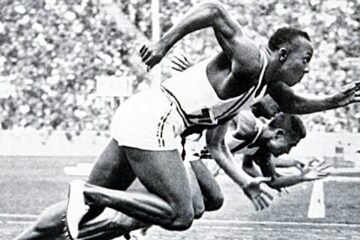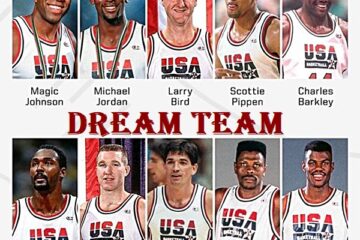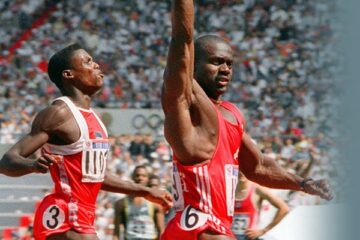Football in the Olympics | Part 1 (1908 – 1928)!
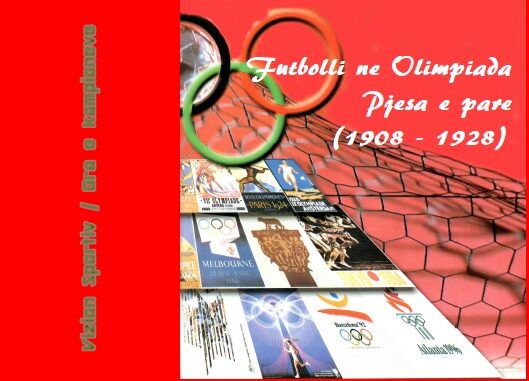
OLYMPICS:
1908,
FIRST EDITION, OFFICIAL FOOTBALL TOURNAMENT EVEN RECOGNIZED BY FIFA IN ITS DIARY!
Football in the Olympics is a contrasting love story. The Olympics as the biggest sports event in the world and football, the world’s most practiced sport, with the exception of the first editions, have found it difficult to get along and rarely has their union aroused real enthusiasm. It was an inexplicable contradiction. But a reason can be found in the controversy of 1912 when the CIO (International Olympic Committee) remained until the last moments in doubt to include football in the program considered a game that was “contaminated” by professionalism and far from a discipline. noble and pure as was athletics, the queen of the games of the five Olympic rings.
This beginning of discrimination, which calls into question the sports character of this discipline, ranks in the quality of the football tournament in the Olympic Games, a tournament which goes into the background starting from v. 1930 with the birth of the World Cup. From this year onwards, the only absolute showcase for football powers would remain the world championship.
However, football as a very popular sport could not be left out of the Olympic Games. And so a solution was sought at that time in respect of the dilettantism that connected them, not taking into account that the true amateur spirit is the enemy of technical and spectacular values that can be trusted. In a paradoxical way, it became a betrayal under the label of dilettantism to save a small self-evaluation of the technical side. Thus, after World War II, football in the Olympics, with the exception of some rare cases, would be restored to a field “occupied” almost exclusively by masked dilettantes from European countries of origin who expressed their maximum values in this sport. Even though what was gained from the technical level had its loss on the competitive side, limiting the fight for the title between four or five dominant teams. After the games in Moscow in v. 1980 gradually the professionalism of the football game has started to frequent the Olympic arena more often. Although the powerful representatives of world football are never introduced, despite the selection of competitive professional players.
Thus, as an example, we can mention the case of Atlanta, where many of the players representing three countries: Nigeria, Argentina and Brazil would become protagonists two years later in the World Cup held in France in 1998. So professional football was coming in slowly. in the Olympics after many years of technical mediocrity. Of course, players like Pele, Maradona, Di Stefano and others have never set foot in these games, but other names like Zamora, Schiavio, Puskas, Rivera, Ronaldo, etc. have marked important, decisive moments, always and everywhere in the stadiums overflowing.
1908 – London.
In fact, it is the third edition in which football takes part in the Olympic program, but the first officially recognized by FIFA. Only….. 5 teams participate: England, Denmark, France (with two teams A and B), Holland and Sweden. 6 matches are also played. The English masters are again Olympic champions, strong, from a dilettante team but without rivals. (the two previous editions the British team won as champions of a demonstration tournament and not Olympic). They won the gold medals in the final against the Danish team (2-0) in the presence of 8000 spectators (!) which for that time was considered a public model. The two presenting teams of France are winning a goal; the “B” team 0-9 on October 19, and the “A” team 1-17 (!) on October 22, 1908, from the Denmark team. Denmark will also write in the annals the first goal scorer in the history of the Olympic games of the football tournament.; Nielsen, author of 11 goals, a name that will appear often in the Scandinavian formation.
FINALS
Places 1-2 London, 24-10-1908 Great Britain – DENMARK 2-0
Places 3-4 London, 23-10-1908 Holland – Sweden 2-0
Final ranking:
1 – Great Britain: Bailey, Corbett, Smith, Hunt, Chapman, Hawkes, Berry, Woodward, Stapley, Purnell, Hardman.
2 – Denmark: Drescher, Von Buchwald, Hansen, Bohr, C. Middelboe, Nielsen-Norland, Lindgren, Nielsen, Wolfhagen, Rasmussen, Andersen, Gandil, N. Middelboe.
3 – Netherlands: Beeuwkes, Hajting, Otten, Sol, De Korver, Mundt, Welcker, Snethlage, Reeman, Thomee, De Broyne-Kops, Kok.
1912 – Stockholm
Participating teams reach the number 11, but there is no shortage of controversies about the participation of football in the Olympic program, because in sports facilities football is considered more of a “game” than a discipline worthy of the Olympics.
However, FIFA insists and wins the agreement of the purists, thanks to the growing popularity of the game. It is played with the direct elimination system, and again England is the winner of the gold medals for the third time; It is July 1, 1912 in Stockholm, when that individual “heroic” act was performed by the German Fuchs who “scored” 10 goals (!), and when the German team suffocated the match with the result that is more like Volleyball, 16-0 (!) The best “bomber” of the tournament will be with those scored goals…..
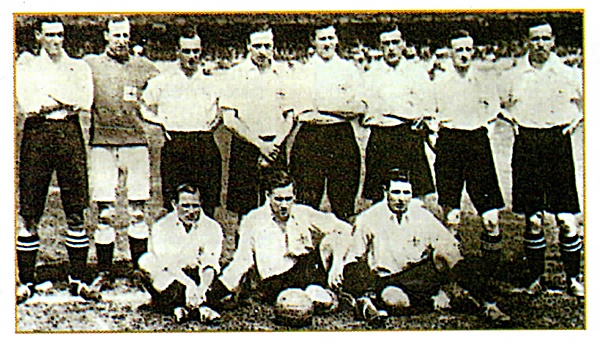
The British team is the champion of v. 1908.
Final Stockholm: 4-07-1912 Great Britain – Denmark 4-2
Places 3-4 Stockholm: 4-07-1912 Holland – Finland 9 -0
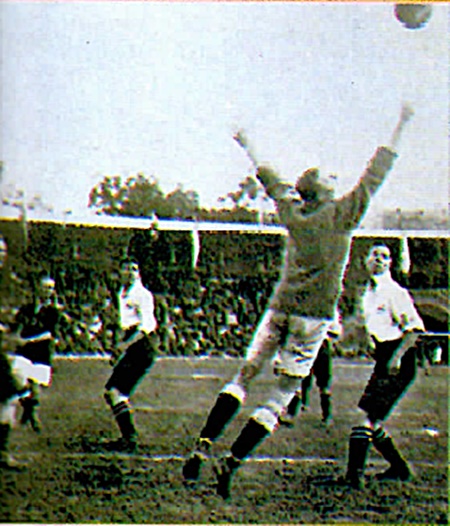
From the final match, action in the English goal
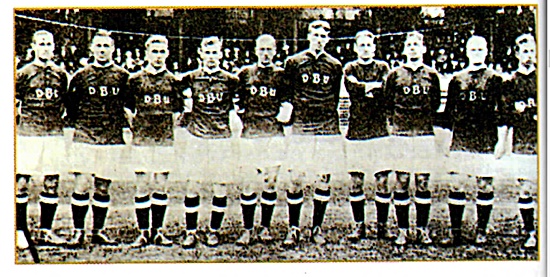
Denmark ranked second in the 1908 edition
Final ranking:
1 – England Brebner, Burn, Knight, Mcwhirter, Littlewort, Dines, Berry, Woodward, Walden, Hoare, Sharpe, Hanney, Wright, Stamper.
2 – Denmark: S. Hansen, Middelboe, N. Hansen, Von Buchwald, Jorgensen, Bert, Nielsen-Norland, Tufvesson, Olsen, Nielsen, Wolfagen, Cristoffersen, Petersen, Seideli-Nielsen, P. Nielsen.
3 – Netherlands: Gobel, Wijnveldt, Bouman, Fortgens, Feith, De Wolf, Lotsy, Boutmy, Van Breda-Kolff, De Groot, Cate, Van det Sluins, Vos, Bouvy, De Korve.
1920 – Antwerp
After the world war and with eight and a half million dead, the Olympics restart and again the Football tournament in which the controversy has flared up badly. And in fact, the final is distinguished “with signs”. September 2, 1920. The home team Belgium is ahead 2-0 against Czechoslovakia, dominant in the first phase, (9-0 against Yugoslavia; 4-0 against Norway; 4-1 against France). The Belgians, on the contrary, have reached the final without playing, but favored by the draw!!!
Meanwhile, the Czechs protest a series of decisions of the English judge Lewis and decide to withdraw from the match. Lewis is the person that the Bohemians have criticized even in the qualifying phase. The Czech team has complained in the cases of the two goals scored in the final, one from a discussed penalty (10′) and the other after a more obvious offside position (28′), adding here the exclusion from the field of play. to Steiner (40`) where the entire team will be withdrawn together with the player. Then she will be disqualified and will also lose the silver medals
Antwerp Final : 2-09-1920 Belgium – Czechoslovakia 2-0 (Victory on the table for the withdrawal of the Czech team which protested against the decisions of the English referee Luis and also the behavior towards public).
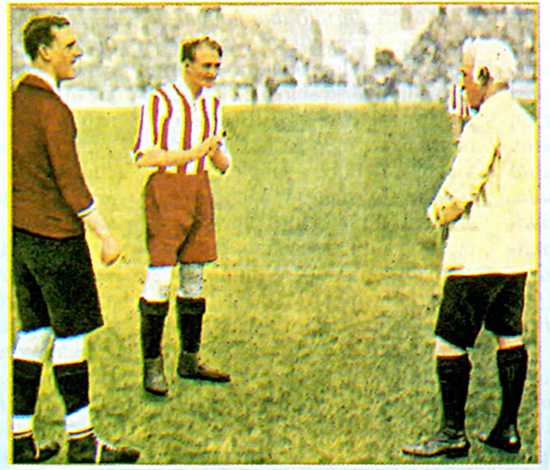
The two captains of the final teams discuss with the English judge Lewis. The captain complains about the match!
Final ranking:
1 – Belgium De Bie, Verbeeck, Swartenbroeck, Musch, Hanse, Fierens, Bastin, Coppee, Bragard, Laroe, Van Hege, Balyu, Nisot, Hebdin.
2 – Spain: Zamora, Vallana, Arrate, Samitier, Belausteguigoitia, Sancho, Eguiazabal, Sesumaga, Arbolaza, Moreno, Gomez Acedo, Artola, Pagatzaurtundua, Sanchez Encinas, Vasquez, Feguieros, Bilbao, Izaguirre,
3 – Hollande: MacNeil, Denis, Verweij, Bosschart, Kuipers, Steeman, Van Rappard, Van Dort, Groosjoan, Von Heijden, J. Buldrer, De Natris, E. Buldrer, Bieshaar.
1924 – Paris
The winner of the gold medals will be Uruguay, even with this victory the parliament will declare a national holiday!!!
This is how you start entering the South American football scene. In this 8th edition of the games, 22 teams participate. Uruguay is declared the winner, the team has the best scorer of the tournament, Cea with 6 goals. June 9 is the date of the victory of the Uruguayans against Switzerland 3-0. The road to the final of the team with blue jerseys is reached after the victory against Yugoslavia 7-0, the USA 3-0 in the round of 16, and then in the quarter-final they beat the local team France 3-1, in the semi-final Holland 2-1.
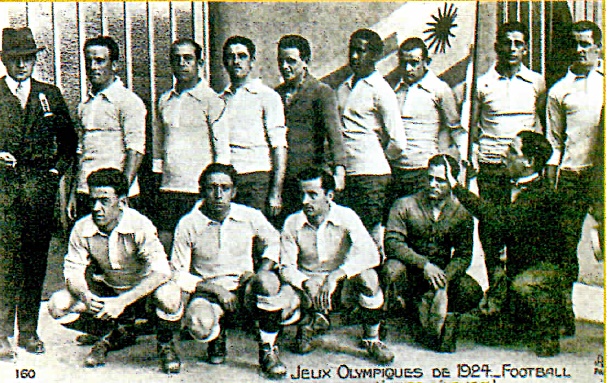
Young Olympic champions – 1924 From left: Skarone, Romano, Cea, Mazzali, Andrade, Petrone, Vidal, Urdinaran, Tomazini, Gierra, Capucini. Sports Vision / Hour of Champions
Paris Final : June 9, 1924 Uruguay – Switzerland 3-0
Final Lineup
1 – Uruguay: Mazali, Nasazzi, Arispe, Andrande, S. Urdinaran, Scarone, Petrone, Cea, Vidal, Ghierra, Romano, Tomasina, Naya, Zibechi, A. Urdinaran,
2 – Switzerland: Pulver, Reymond, Ramseyer, Oberhauser, Scmiedlin, Pollitz, Ehrenbolger, Pache, Dietrich, Abegglen II, Fassler, Bedouret, Mengotti, Sturzenegger, Kramer.
3 – Sweden: Lindberg, Alfredsson, Hillen, Holmberg, Friberg, Sundberg, Lundquist, Rydell, Kaufeldt, Keller, Kock, Carlson, Brommesson, Svensson, Dahl, Hirsch, Lindquist, Mellgren.
1928 – Amsterdam
The last edition where the games are organized as a pure sporting event of dilettanteism without propaganda purposes. Football is now the sport that is followed more by the public; 251,747 spectators in the 17 matches played. But it has not yet been fully accepted as an Olympic discipline. And in fact, the football tournament takes place one month before the games in this Olympics. This is the fact that football is kept different from other sports for reasons of dilettantism. The winners are once again the Uruguayan football players in an absolute way against Argentina, who, even though they have the best goal scorer of the tournament, Tarasconi, ranks second with 11 goals. Eternal finale. Uruguay wins 2-1, but…..after two games (the first ended 1-1) and after 210 minutes of play. In the round of 16, Uruguay beat Holland 2-1; in the quarter-final defeats Germany 4-1 and in the semi-final Italy 3-2 (9`Baloncieri; 17`Cea; 28`Campolo; 31`Scarone; 60`Levratto).
Final Amsterdam 10 June 1928 Uruguay – Argentina 1 – 1
Amsterdam: 13 June 1928 (replay) Uruguay – Argentina 2 – 1
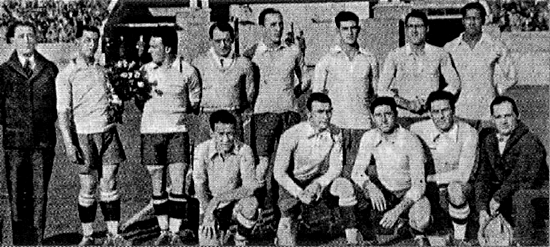
Uruguay champion for the second time – 1928 From left: Arispe, Kanavez, Macali, Gjestido, Kampolo, Fernandez, Andrade, Urdinaran, Petrne. Cea, Skarone
Final ranking:
1 – Uruguay: Mazali, Nasazzi, Arispe, Andrande, Urdinaran, Scarone, Petrone, Cea, Fernandez, Piriz, Gestido, Castro, Campolo, Canavesi, Arremon, Borjas, Figueroa.
2 – Argentina: Bosio, Paternoster, Bidoglio, Evaristo, Monti, Medici, Orsi, Gaizrarian, Ferrera, Tarasconi, Carricaberry, Perducca, Diaz, Cherro, Orlandini, Calandra,
3 – Italy: Combi, Bellini, Caligaris, Pitto, Bernardini, Genovesi, Baloncieri, Banchero, Schiavio, Magnozzi, Levratto, De Pra`, V. Rosetta, Pietroboni, Janni, Rivolta, Rossetti. .
…….continues with other parts!
Link for the 2-nd Part: https://www.sportsvisionplus.com/football-in-the-olympics-part-2-1936-1948/
March 2021
__________________
Sports Vision + / The Hour of Champions, since 2013
References: information was taken from personal notes, articles & summarized translations, “Calcio – 2000” magazine personal collection of the years 2000-2005 / TV Show “Tacalabala Gooooal! – Il racconto del calcio” / Palcoscenico” / “Storie Mondiali” / “la gazzetta.it” .
Follow us:
Facebook: https://www.facebook.com/VizionSportiv
Dailymotion: https://www.dailymotion.com/kinetografiashqiptareartisporti
Blog: https://pierosportvision.blogspot.com/
Discover more from Sports Vision +
Subscribe to get the latest posts sent to your email.


